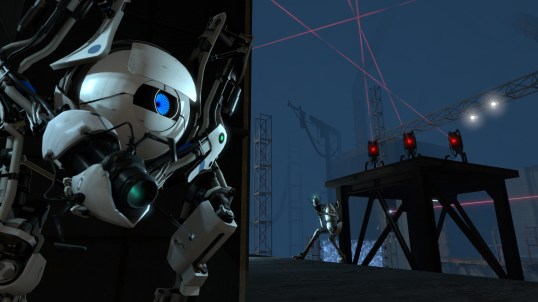Easily the most anticipated release this year, Portal 2 follows publisher Valve’s physics-puzzler Portal, the 2007 game that instantly leapt onto Game of the Year lists and into the Best Games Ever pantheon. You played as Chell, a hapless human female made to test a teleportation gun in the Aperture Science research facility, hounded by a bitchy AI named GLaDOS. The Genetic Lifeform and Disk Operating System herded players through a series of test chambers where you bent the rules of physics, and didn’t give a damn if you lived through the process. What made Portal so beloved was the ingenuity of its brain-bending, physics-based puzzles, GLaDOS’ snarky antagonism and the singularly well-executed gimmick of on-demand teleportation. Furthermore, the game’s perpetual tease of dessert-as-reward and its poignant, musical aftermath all became memes that extended beyond hardcore gamers.
(More on TIME.com: What We’re Looking Forward to in 2011: Video Games)
When rumors swirled that Portal 2 might release early, fan desire hit fever pitch. What actually came about was a bit different but only fueled the fervor. No pressure, right Valve? Thankfully all the Portal trademarks return in spades and with perks. The single-player portion is much longer than the first game’s amuse-bouche length, and Portal 2 extends things with a cooperative play campaign that lets two people control robot partners for double the teleportational madness.
In single-player, you play as Chell again and find her/yourself waking up after centuries of sleepy stasis. The time between games hasn’t been kind to Aperture Science. Its spotless white halls have been busted up and rusted over, victim to some nameless catastrophe. GLaDOS returns–even bitchier after being dispatched in the first game–and plots to torment Chell with a lifetime of testing her way through a never-ending series of deathtraps.
(More on TIME.com: Rapture Match #2: GlaDOS (Portal) vs The Reapers (Mass Effect))
Portal 2′s biggest risk comes from changing its formula. The first game was a gleaming exemplar of minimalism, super-spare even down to its play mechanics. Create an entrance and exit with your portal gun, pressing buttons and placing cubes to exit various death-dealing rooms. Portal 2 adds additional gimmicks like catapults and lasers as well as other characters.
You might argue additions like these dilute the purity of the experience, but everything’s still executed with Valve’s high level of charm and panache. Portal‘s signature trick was flinging, jumping from great height through one side of a portal and keeping the momentum through the other side to cover great distances. Here, you’re not just manipulating momentum but also light as well. You’ll need to redirect lasers and light bridges to get from point A to point B.
(More on TIME.com: This Is Quite Funny If You’ve Played Portal)
The best thing about the first Portal games was the commentary it made on highly structured corporatism, like a stripped-down sci-fi cousin to Office Space. Portal 2′s a different kind of funny. It’s jokier, chattier and a bit more mean-spirited at times. Where the first game felt chilly and academic, this game evinces a certain weariness and wariness that makes the human vs. AI faceoff much more charged. A lot of the game plays out as a dysfunctional grudge match against GLaDOS, but there’s also a sliver of backstory provided by a key character voiced by J.K. Simmons. Instead of the first game’s mute Companion Cube, you get actual companionship, a bumbling hyper-verbal robot eyeball named Wheatley, voiced in winning fashion by Stephen Merchant (Ricky Gervais’ writing partner on the original UK version of The Office).
The game’s dirtier, clunkier world might be more inelegant but its onion-skin layers still tell a multi-layered story that’ll make you laugh out loud. Most importantly, the gameplay’s high points–those mind-expanding moments of wonder and accomplishment–are present and accounted for.
You start out as always, entering a test chamber and wondering how the pieces fit together. Then it’s on to opening portals, jumping off ledges, and redirecting light in bouts of trial-and-error until you come upon the solution. The puzzles in co-op are even harder, but the difficulty fuels a nice feedback loop. Not only do you feel smarter than you were when the level started but the crankier tone makes every beaten test chamber feel like a bigger victory.
(More on TIME.com: Valve Plots Living Room Takeover with Steam)
Portal 2‘s change of direction illustrates Valve’s growth as a developer. They’re able to poke fun at themselves in the game’s opening minutes, take our beloved GLaDOS to just the right side of unlikability and accommodate a market demand for multiplayer without making it feel tacked-on or forgettable. The sequel still manages to dazzle without having that rush of newness that buoyed its predecessor and, on top of that, it’s arguably the best comedy entertainment video games have yet produced. For anyone worried that Portal 2 couldn’t live up to the hype, the spark of awesome inside the first-person puzzle series is very much… still alive.
Techland Score: 10 out of 10


